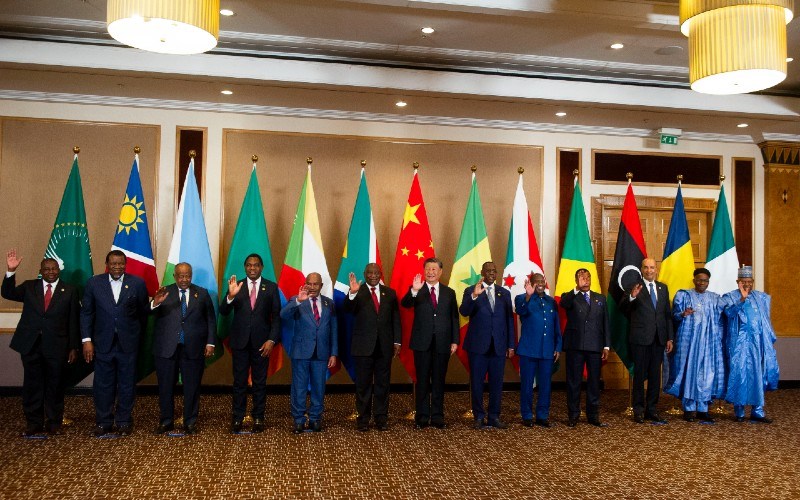The BRICS countries are expanding, and they see a chance to take a wobbly superpower down a peg. Iran and Saudi Arabia were among six countries invited to join the economic bloc that began as Brazil, Russia, India, China and South Africa (BRICS). Most of the leaders of these nations confirmed their resolve at a meeting in Johannesburg, South Africa last week, The Associated Press reported.
Russian President Vladimir Putin chose not to attend in light of the International Criminal Court arrest warrant issued against him because of the war in Ukraine.
The United Arab Emirates, Argentina, Egypt and Ethiopia are also set to join BRICS beginning Jan. 1, 2024.
The U.S. dollar has for years been the most commonly held reserve currency and the most widely used currency for international trade and other transactions around the world. But U.S. debt, inflation and interest rates are changing that. The dollar accounted for more than 70% of reserve currency in the early 2000s. It accounted for roughly 60% at the end of last year.
Dr. Dave Brat, the dean of Liberty University's School of Business, said on Washington Watch Friday the expansion of BRICS is "a reaction against the overreach" of the United States.

"And finally, we've gone too far," he exclaimed. "We're $50 trillion in debt, and when the rest of the world is seeing your higher interest rates and the probability that you might not pay off your debt in the future they say, 'Uh, not sure about this.'"
Brat continued: "Plus, we had inflation at 9% last year, which devalues their money. If they're holding dollars, their dollars are being devalued. Why would anybody want to do that?"
The Liberty University dean told show host Jody Hice that other countries will soon join those eager to take advantage of American weakness. "What's really going on here is we're debating the loss of our global reserve currency," Brat said.
According to Brat, Brazil, Russia and China individually are not attractive to investors – but collectively is something else. BRICS, he explained, will form a gold-backed currency and combine it with "blockchain" technology, which enhances transparency and security.
A dereliction of fiscal duties
"This is the result of dereliction of our fiscal duties over decades," Brat said. "If you put all that together, you have a valid currency that's going to maintain its strength because of gold, and you don't have to worry about security because of blockchain. So, it's a real threat. It's a signal to the U.S. to get our act together."
Confidence is low that the U.S. act will improve. For years the Britian-U.S. partnership against the Soviet Union and the communist threat gave America standing in the world, but the world has changed, Brat said.
"Now China is our biggest threat, and we are just ill equipped, right? We're doing woke stuff in the military. We're $50 trillion in debt. We have an open border. The kids can't read in the third grade, and the Federal Reserve has ruined our economy over the past 20 years," he said.
 The BRICS expansion comes as the U.S. government's foreign assistance arm – The U.S. Agency for International Development (USAID) – recommends advancements in its LGBTQ policies.
The BRICS expansion comes as the U.S. government's foreign assistance arm – The U.S. Agency for International Development (USAID) – recommends advancements in its LGBTQ policies.
"USAID operationalizes the inclusion of LGBTQI+ people into USAID's development approach through the 2023 LGBTQI+ Inclusive Development Policy. Recognizing that locally led, LGBTQI+ inclusive development strengthens livelihoods, economies, and democracies, the Policy provides a blueprint for integrating LGBTQI+ individuals in USAID policy and programming," the group writes.
The translation is the Biden administration has pushed a far-left, hyper-sexualized agenda at home. It's been rejected by many state legislatures that have passed laws protecting children from gender-mutilation surgeries or banning biological boys from playing on girls' sports teams.
Biden, however, made a commitment in 2021 to advance LGBTQ policies around the world, not just in the U.S. Now those policies are having an impact on the U.S. dollar.
U.S. involving itself in LBGTQ discussion in Japan
Economist Peter St. Onge, a research fellow with The Heritage Foundation, said on American Family Radio in June that Biden's LGBTQ policies were causing problems with an ally, Japan.

"There's a big debate in Japan over LGBTQ questions, and the American ambassador, who in theory speaks for Biden, has been sticking his nose into domestic issues and really putting on a lot of pressure," St. Onge said.
Rham Emanuel, the former mayor of Chicago, was confirmed in 2021 as the U.S. Ambassador to Japan. The Japanese have taken offense at Emanuel, one Okinawa-based journalist telling Fox News in early May, "What they're doing is to push LGBTQ ideology to us, and it's destroying our culture."
Brat sees U.S. overseas policy having a similar effect.
"We're having a CEO summit at Liberty October 10-12. We're hosting a bunch of African delegations from Nigeria, DRC. They're scratching their heads along those lines. They don't know what's going on with these U. S. Initiatives.
"And of course, this tracks the greater concern. The L. G. B. Alphabet pronoun stuff is a sign of a Wall Street Journal poll a few months back, which showed that the United States is losing our religiosity and losing our patriotism, both down 30 points in the last five years," Brat said.







